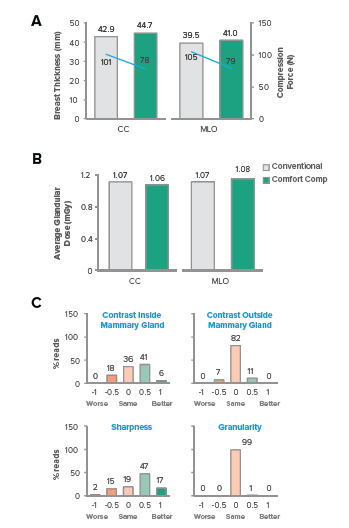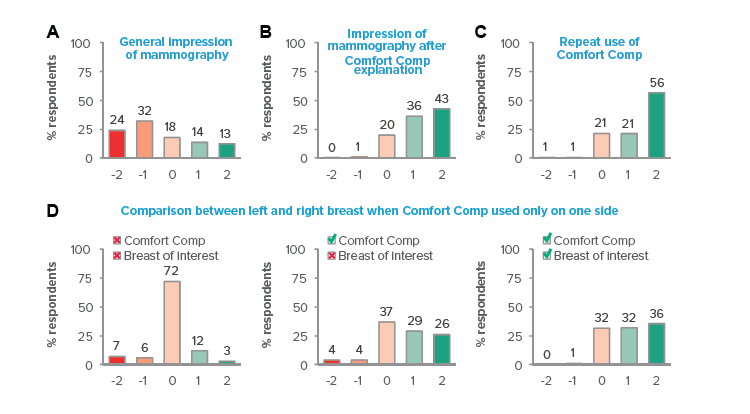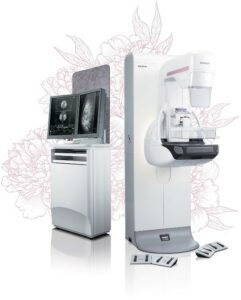Brought to you by Christie Innomed
The advent of mammography screening started in the 1960s, with radiologists performing mammography exams using general purpose X-ray tubes and no compression. In the next decade, mammography advanced significantly with the introduction of screen-film mammography, which made imaging faster, required lower radiation dose, and provided greatest contrast.
 As the technology improved, mammography screening for breast cancer also became more common. Early detection is the key to breast cancer outcomes with mammography central to the fight. The unique insights radiology offers provide answers and even at times peace of mind.
As the technology improved, mammography screening for breast cancer also became more common. Early detection is the key to breast cancer outcomes with mammography central to the fight. The unique insights radiology offers provide answers and even at times peace of mind.
At the turn of the century, breast imaging experienced another significant advancement with the introduction of digital mammography. While digital mammography is performed the same way as analog from the patient perspective, the machine uses signals to produce images that can be read on computers rather than X-ray film. Today, most radiology practices now use digital mammography because, compared to analog film, it provides better quality images with improved tissue contrast.
Drawing on more than 35 years of digital mammography detector and image processing expertise, Fujifilm’s ASPIRE Cristalle mammography system combines technological advances with patient-focused ergonomics designed for faster, more confident diagnosis and exceptional patient comfort.
Mammography using Comfort Comp requires that normal breast compression be applied initially to ensure proper breast positioning and to take full advantage of the hysteresis principle. Once completed, automatic decompression is activated, shortening the time that the breast is under maximum pressure with minimal changes to breast thickness or image quality.
Automatic compression reduction control via Comfort Comp leads to negligible changes in breast thickness and average dose and produces images of similar quality compared to those obtained under conventional compression.
In contrast, the patient experience is markedly improved: 56% of participants indicated they had a negative general impression of mammography prior to exposure to Comfort-Comp, while 79% answered they felt more relaxed and/or experienced pain reduction once Comfort Comp was explained to them, and 78% of patients stated they would use it again. In addition, explaining Comfort Comp had a significant effect in enhancing the patient experience, regardless of whether the breast in which Comfort Comp was used was specified, underscoring the importance of patient education.

Based on hysteresis of breast tissue, the Comfort Comp compression control feature in ASPIRE Cristalle systems allows for automatic decompression that does not affect breast thickness. To determine how differences in compression force impact average dose and overall image quality, image sets from 2,400 distinct patients obtained using ASPIRE Cristalle’s conventional and Comfort Comp modes were analyzed and compared. The study results confirm that Comfort Comp-mediated compression reduction does not alter breast thickness or patient dose, while producing images of similar quality to those acquired with conventional compression modes. Furthermore, patient feedback indicates that Comfort Comp effectively reduces anxiety and pain associated with mammography, improving the likelihood of patients adhering to periodic screenings and making it a viable strategy for increasing early cancer detection.
 Prioritizing the patient experience can bring about additional benefits beyond increased screening compliance, with studies showing that increased patient relaxation during mammography can translate to better positioning and improved image quality. Our results seem to agree with these findings, with improved image quality observed when Comfort Comp was used compared to images acquired with conventional compression.
Prioritizing the patient experience can bring about additional benefits beyond increased screening compliance, with studies showing that increased patient relaxation during mammography can translate to better positioning and improved image quality. Our results seem to agree with these findings, with improved image quality observed when Comfort Comp was used compared to images acquired with conventional compression.
The goal of FUJIFILM is to help improve breast cancer screening rate. The #1 reason women do not go for their mammogram is the pain and discomfort associated with compression. We are proud that the Aspire Cristalle can contribute to better outcomes and victories over breast cancer. We will continue driving innovation, inspiring hope and together with the healthcare community have a lasting and profound effect on people’s health.
